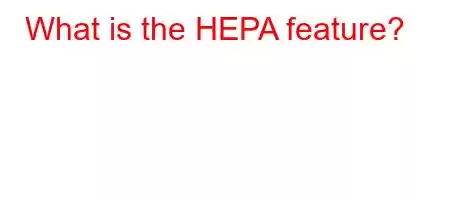Blog What is the HEPA feature?
Contents
What is HEPA feature?
Hepa (High Efficiency Particulate Arresting) filter and above are filters that can purify airborne particles up to 0.3 microns. Filters with a ratio of .97 are called True Hepa filters.
What does H 13 mean?
AISI H13 (DIN/ISO 1.2344) steel, high hot hardness, high It has hot strength, high tempering resistance, high toughness, good machinability, excellent dimensional stability in heat treatment and is a suitable material for surface treatment.
Where is HEPA filter used?
HEPA filters are extensively used in air cleaners, ventilation systems, automotive air filtration, gas turbine air filtration and cleanroom filtration.
HEPA 10 or HEPA 13?
HEPA 10 = It removes 15,000 out of 100,000 particles from the exhaust. HEPA 11 = removes 5,000 out of 100,000 particles from the exhaust. HEPA 12 = removes 500 out of 100,000 particles from the exhaust. HEPA 13 = Removes 50 out of 100,000 particles from the exhaust.
What happens if there is no HEPA filter?
HEPA filters remove more than 99.9% of the particles in the air stream passing through them. These particles can be allergens, viruses, bacteria, chemical compounds, dust and many more.
Which group is the HEPA filter used for?
A little below this rate the rest are called Hepa filters. Filters with a rate of 99.99% are called ULPA filters. must exist. Before the air is released into the environment, it passes through the HEPA filter. The HEPA filter class may be H13.
What is a HEPA 10 filter?
HEPA (High Efficiency Particulate Catcher) filters are filters with a large capacity to filter out tiny particles (really small ones!). HEPA filters remove more than 99.9% of the particles in the air stream passing through them.
What does the HEPA 13 filter do?
Should the HEPA filter be replaced?
HEPA filters need to be replaced over time under all circumstances, this is a necessary principle for vacuum cleaners to work efficiently. They can be used up to 2 years in homes and less frequent uses. In very frequent use, HEPA filters should be checked every 6 months, and if they are clogged, they should be replaced.
What happens if there is no vacuum filter?
Contamination of vacuum cleaner filters causes a decrease in suction power and performance. In addition, since it will prevent the air circulation inside your machine, it will cause the vacuum to overheat. High heat can damage the parts and engine of your machine.
What is the HEPA filter Urgent?
Read: 194


